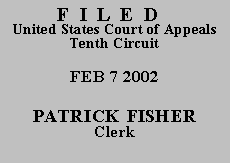

| HARRIS W. LEE, |
|
Mr. Lee's § 1983 claim seeks damages and equitable relief, alleging, first, that defendants violated certain state statutes and contract requirements by housing state prisoners in privately-owned county correctional facilities. He further alleges that the law libraries in these facilities have been closed, thereby depriving him of access to the courts. According to Mr. Lee, these actions violated his rights under the First, Fifth, and Fourteenth Amendments.
The district court dismissed the complaint under 28 U.S.C. § 1915(e)(2)(B) and Fed. R. Civ. P. 12(b)(6), and judgment was entered on May 22, 2001. I R. Doc. 9. Mr. Lee then filed a motion to alter or amend the judgment pursuant to Fed. R. Civ. P. 59(e) on June 4, 2001. I R. Doc. 10. Apparently not realizing that Fed. R. Civ. P. 6(a) applies to exclude weekends and holidays in computing the ten-day period of Rule 59(e), see Advisory Committee Note to 1995 Amendment to Rule 59(e), the district court construed the motion as one arising under Fed. R. Civ. P. 60(b). Van Skiver v. United States, 952 F.2d 1241, 1243 & 1243 n.2 (10th Cir. 1991). The post-judgment motion was then denied. On June 18, 2001, Mr. Lee filed his notice of appeal from the May 22, 2001 judgment. See Fed. R. App. P. 4(a)(4)(a)(iv).
Mr. Lee has no constitutional right to placement in a particular penal institution, private or public. Rael v. Williams, 223 F.3d 1153, 1154 (10th Cir. 2000); Prows v. Federal Bureau of Prisons, 981 F.2d 466, 468 n.3 (10th Cir. 1992). Further, Lee's allegations that defendants violated state laws and contract provisions do not include an allegation of a violation of a federally protected right, and therefore, this portion of the complaint was rightfully dismissed. Baker v. McCollan, 443 U.S. 137, 140 (1979).
Further, Lee's failure to "establish relevant actual injury," Lewis v. Casey, 518 U.S. 343, 351 (1996), or otherwise allege active interference with his preparation and filing of legal documents, id. at 350, warrants dismissal of his claim that defendants' failure to provide a library denied him access to the courts.
Finally, Lee's allegations of retaliation are insufficient. He alleges no "specific facts showing retaliation because of the exercise of [his] constitutional rights," Peterson v. Shanks, 149 F.3d 1140, 1144 (10th Cir. 1998) (quotation omitted).
For substantially those reasons set forth in the district court's order dated May 22, 2001, I R. Doc. 8, we AFFIRM the district court's judgment.
Entered for the Court
Paul J. Kelly, Jr.
Circuit Judge
*. This order and judgment is not binding precedent, except under the doctrines of law of the case, res judicata, and collateral estoppel. This court generally disfavors the citation of orders and judgments; nevertheless, an order and judgment may be cited under the terms and conditions of 10th Cir. R. 36.3.
2. After examining the briefs and the appellate record, this three-judge panel has determined unanimously that oral argument would not be of material assistance in the determination of this appeal. See Fed. R. App. P. 34(a); 10th Cir. R. 34.1(G). The cause is therefore ordered submitted without oral argument.